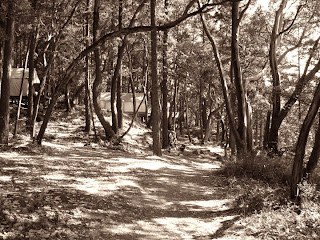I pass this little gate occasionally on my way home -- it sits beside the road on one of the alternate routes across my part of the island. And I always find it so appealing, even though -- as far as I can tell -- it leads nowhere.
I wonder now -- having spent my morning as if in college, reading Mary Oliver's critiques of Robert Frost and Gerard Manley Hopkins in her book, Winter Hours -- what my choice of images in these blogs, and how I choose to speak of them, will say, or are saying to readers now or years from now (should anyone choose to read with that sort of critical eye).
I was an English major, at a fine and fierce New England college, so Frost and Hopkins are hardly strangers to me; in fact I'm certain their influence on my poetry (because I read it so extensively in my youth) is far stronger than that of either Mary Oliver or Rumi and Hafiz, whom I read so avidly now.
In some ways it feels at times as if I'm trapped in a net of rhythm, carefully woven, trochee by iamb, by these two men and all the folks who wrote the hymns that so dominated my childhood: (even now, when I walk for any distance, the words and music of Isaac Watts' majestic "I sing the mighty power of God" seem to carry my feet forward and resonate in my veins.)
The net is tightest, I think, around Hopkins, whose earnest exuberance is so rigidly contained that I now find his work just exhausting -- and sort of painfully over-embellished -- to read. But I'm not certain I ever understood that tension came from the tension in his own life between his Jesuit understanding "that sacrifice is bliss and self-indulgence is the real death; ... that nearness to God could be brought about by increasingly rigorous behavior, more prayer, more work, more abstinence," and his intense, rejoicing appreciation of the natural world -- "landscapes and waterways and copses, and especially the yearly gift of spring -- in which he read the proof of God."
And though I may have known -- and still think of -- Frost as an irascible old man, I don't remember noticing that "the voice of Frost's poems...is the voice of a man who finds life a trial, who finds the physical world handsome but fragile, who finds reality less than his expectation, who finds no easy solution to his desire for solitude and his longing for community, who finds love an agony, who finds no sweet that is not bonded to bitter."
I never thought to notice how that voice evolved over the years in response to public accolade, never saw that "the poems became, in the later books, entertainments and pronouncements... as though Frost felt himself obliged, as a public man, to display a reasonable cheerfulness, whatever he felt privately." And yet, reading that, I wonder how much my own work may be influenced by the very nature of writing publicly; I worry a lot that each day's piece -- the combined work of meditation and poem -- becomes a sort of sermon, determined, always, to find message and encouragement, to honor the struggle but always to hold it in balance with the larger good, the larger message, the heartening cry of hope...
And so I look at the way this gate appeals to me -- even though it seems to lead only to darkness and confusion -- and wonder (given that what draws me to Oliver, Rumi and Hafiz is the lightness and chaotic charm that permeates their work) if I will ever step past the dark rigidity of those childhood influences, release the oughts and shoulds that seem to trip my writing up, or if -- because, as the posts these lasts few days have mused, we are so deeply ruled by childhood influences -- my job, like that of these two masters (and let me reassure you that I have no illusions about being in their league) will always be to stand at the gateway, balancing the light outside with the dark beyond and within, caught in those determined verticals of line and structure...
Christmas at LUSH | 'Snow Fairy' & 'Hot Toddy'
11 years ago






























